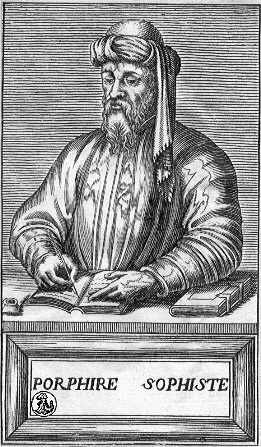2 - 4
Auxiliaries to the Perception of Intelligible Natures
Kontext: Things essentially incorporeal, because they are more excellent than all body and place, are every where, not with interval, but impartibly.
Things essentially incorporeal are not locally present with bodies but are present with them when they please; by verging towards them so far as they are naturally adapted so to verge. They are not, however, present with them locally, but through habitude, proximity, and alliance.
Things essentially incorporeal, are not present with bodies, by hypostasis and essence; for they are not mingled with bodies. But they impart a certain power which is proximate to bodies, through verging towards them. For tendency constitutes a certain secondary power proximate to bodies.
Porphyrios: Zitate auf Englisch
7 - 10
Auxiliaries to the Perception of Intelligible Natures
Kontext: The soul is bound to the body by a conversion to the corporeal passions; and again liberated by becoming impassive to the body.
That which nature binds, nature also dissolves: and that which the soul binds, the soul likewise dissolves. Nature, indeed, bound the body to the soul; but the soul binds herself to the body. Nature, therefore, liberates the body from the soul; but the soul liberates herself from the body.
Hence there is a twofold death; the one, indeed, universally known, in which the body is liberated from the soul; but the other peculiar to philosophers, in which the soul is liberated from the body. Nor does the one entirely follow the other.
We do not understand similarly in all things, but in a manner adapted to the essence of each. For intellectual objects we understand intellectually; but those that pertain to soul rationally. We apprehend plants spermatically; but bodies idolically (i. e., as images); and that which is above all these, super-intellectually and super-essentially.
5 - 6
Auxiliaries to the Perception of Intelligible Natures
Kontext: Soul, indeed, is a certain medium between an impartible essence, and an essence which is divisible about bodies. But intellect is an impartible essence alone. And qualities and material forms are divisible about bodies.
Not everything which acts on another, effects that which it does effect by approximation and contact; but those natures which effect any thing by approximation and contact, use approximation accidentally.
Introduction to Aristotle's Organon, as translated by Octavius Freire Owen (1853), p. v
Kontext: The utility of a science which enables men to take cognizance of the travellers on the mind's highway, and excludes those disorderly interlopers, verbal fallacies, needs but small attestation. Its searching penetration by definition alone, before which even mathematical precision fails, would especially commend it to those whom the abstruseness of the study does not terrify, and who recognise the valuable results which must attend discipline of mind. Like a medicine, though not a panacea for every ill, it has the health of the mind for its aim, but requires the determination of a powerful will to imbibe its nauseating yet wholesome influence: it is no wonder therefore that puny intellects, like weak stomachs, abhor and reject it.
3, 18, 1
On Abstinence from Killing Animals
1
Auxiliaries to the Perception of Intelligible Natures
“So people should abstain from other animals just as they should from the human.”
4, 9, 6
On Abstinence from Killing Animals
3, 2, 4
On Abstinence from Killing Animals
“The Pythagoreans made kindness to beasts a training in humanity and pity.”
3, 20, 7
On Abstinence from Killing Animals
“The fleshless diet contributes to health and to a suitable endurance of hard work in philosophy.”
1, 2, 1
On Abstinence from Killing Animals
11
Auxiliaries to the Perception of Intelligible Natures
2, 39, 4
On Abstinence from Killing Animals
